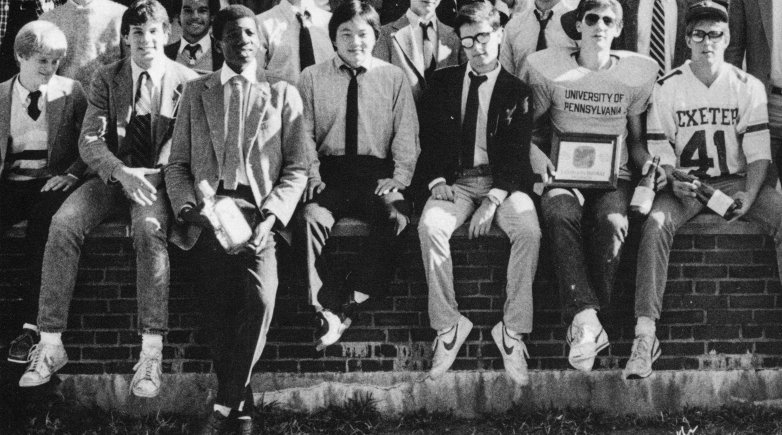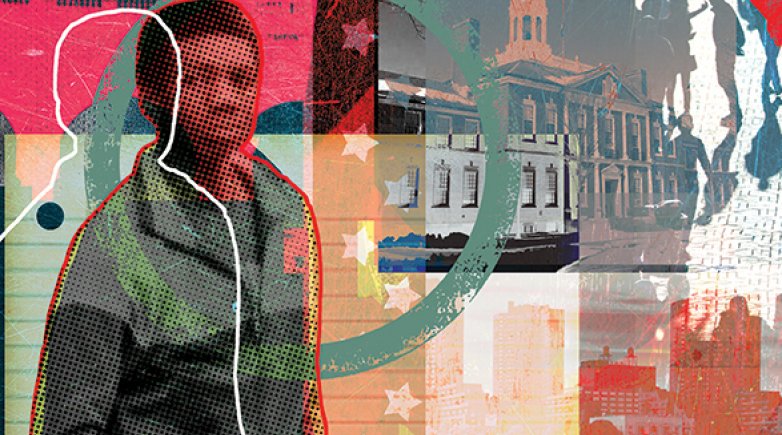Lessons to learn from the life and death of Eddie Perry '85
The shooting by police of the 17-year-old Black man and his imperfect Exeter experience still resonate 35 years later.
Eddie Perry (front, third from left) poses with his McConnell Hall dormmates during his senior year.
As the country confronts a legacy of racism amid the latest flare of deadly violence against members of the Black community, Phillips Exeter Academy remembers another Black life taken too soon.
Thirty-five years ago, June 12, 1985, Edmund Perry was fatally shot by a police officer on a street corner in his native New York City. He had graduated from the Academy just 10 days earlier and was spending summer at home working for a Wall Street brokerage firm before starting at Stanford University that fall. He was 17 years old.
Perry’s death grabbed national headlines and stunned the Exeter community. How could their friend, their classmate, their student, be gone so suddenly, in an act so violent and inexplicable? What happened? What went wrong?
Thirty-five years later, as more Black Americans are killed and the country grapples with festering systemic racism, Exeter finds itself asking questions again. How have we failed the Black members of our community? Why do members of that community feel less than fully valued and fully embraced here? How can we be better?
Eddie Perry’s death resonates today amid killings that seem so grimly similar and all too commonplace. But the life he lived on our campus and the experiences he had here as a Black student resonate, too, as the Academy examines how it can become a more inclusive and actively anti-racist community.
'Learning from his life'
The official record remains disputed. The police department’s account said Perry and his older brother, Jonah, assaulted a plainclothes officer in a robbery attempt and Perry was shot by the officer in the scuffle. The Perry family said that account is a lie, that the shooting was part of a pattern of police violence against Black people and other people of color in the city.
Jonah Perry, a rising sophomore at Cornell University at the time, was charged with assaulting a police officer. A jury deliberated for four hours before finding him not guilty. The police officer was cleared of any wrongdoing after an internal department review.
David Weber, instructor in English emeritus, delivered remarks at a memorial service for Perry at Exeter in September 1985. “Whatever the exact pattern of responsibilities and resentments, of expectations and confusions, of needs and angers and chance that took him from us, even the truth of that night will be an incomplete version of the life Eddie lived and left to us,” Weber said. “Whatever the meanings of his death, they should not prevent us from honoring and learning from his life as a whole.”
Perry came to Exeter as a prep in the fall of 1981. He and Stephanie Neal-Johnson ‘85 were two of just 31 Black students on campus, and Neal-Johnson said Perry was ardent in embracing his opportunity while making it more available to others like him.
“He was a very precocious young man, and he would remind me of things that didn’t make sense to me coming from a 14-year-old,” Neal-Johnson told a 2018 assembly honoring Perry. “He would remind me of our shared responsibility to bring others along, that this notion of activism was very much relevant, was very much alive and important as to why we had come to the Academy.
“Though we were at the Academy, though we were so fortunate to have this opportunity, he said, there were so many that we had left behind at home … who would never have those same opportunities.”
Chris Fuller ’85 met Perry the same prep fall. He described to the 2018 assembly audience how he got to know Perry through pick-up basketball games that first year and told of his appreciation for how Exeter provided the opportunity to befriend people whom he likely would not have met otherwise, including a kid from Harlem. Fuller said he and Perry had things in common in spite of that, including spending time in Europe — Fuller in Germany living with his family; Perry during a school-year abroad program in Spain as an upper — addressing assembly as seniors and graduating “despite maybe not having complied with all the rules.”
It was after that “transformative” year in Spain when Arminda Thomas ’87 met Perry. She spent her first day as a new lower being escorted around campus by Perry, who was back at Exeter to begin his senior year. A close friendship took hold by sundown.
“He was sharing things it felt like he had spent a lot of time thinking about,” Thomas told the 2018 assembly. “Even the funny stuff felt kind of deep. Being back at Exeter was strange for him, and he said as much, but I don’t think I appreciated how out of sorts he felt.”
'Remember his name'
In February of his senior year, Perry addressed assembly as a member of what is today the Afro-Latinx Exonian Society. He chose to recite a speech originally delivered to an assembly audience in 1968 to illustrate that Exeter had made little progress addressing racial inequities on campus.
Weber said, “Eddie knew that the race prejudice that exists here is usually unrecognized, and he tried very hard to raise issues, especially racial issues, in a way that took others' attitudes — their good will as well as their unconscious condescension — into account. He was respectful of everyone's right to their own experience and respectful of their ability (which he tried to nourish) to move beyond prejudice to less limited ideas and values.”
Weber recalled Perry as someone “who did not seek or enjoy conflict, but also someone who had certain requirements: honesty; dignity; understanding. He cared more about those values than about making things socially comfortable. His style was often confrontational, but the confrontations were aimed at replacing indifference or evasive silence or conventional courtesy with real, reciprocal communication, with growth.”
Whether or not Perry felt he had made progress in that pursuit, his quote in the 1985 yearbook reveals frustration as his senior year — and his Exeter experience — came to an end.
“Goodbye Exeter, you taught me and showed me many things … God bless you for that,” Perry wrote. “Some things I saw I did not like and some things I learned I’d rather not know. Nevertheless, it had to be done because I could never learn not to learn. It’s a pity we part on a less than friendly basis, but we do. Work to adjust yourself in a changing world, as will I.”
Ten days after celebrating graduation on the Academy lawn with the class of 1985, Perry was dead. Neal-Johnson recalled how she learned of his death, her mother hollering to her in their Cleveland home that her classmate Mike Eberstadt ’85 was on the phone.
She picked up the phone and said, “‘Hey, Mike, what’s happening!?’” she recounted. “He didn't laugh. There was no smile in his voice.”
Eberstadt told the 2018 assembly that Perry’s death, “felt epically, uniquely tragic. But, looking back, maybe it wasn’t,” ticking off a list of more recent Black victims who died in police custody, including Amadou Diallo, Michael Brown, Freddie Gray and Eric Garner. “In the end, what is the difference? Or rather, what’s the sameness?”
Eberstadt attempted to explain to the assembly audience why a person who had died more than 30 years earlier, merited an assembly; to put into perspective why Perry’s life and death should matter to these students.
“When Eddie was killed, I finally understood that he and I, while both from New York, our apartments not two miles from each other, our circumstances could not have been more different,” Eberstadt said. “I was born into every advantage that money and my race could afford. At Exeter, I did not have to contend with myriad daily stressors, small and large, that must have sapped the energy of my classmates. At home, I did not have to worry about my personal safety from regular people or agents of the government. And in the back of my mind, there was always the sense that I was sitting on a long-term insurance policy that read, ‘Things will probably turn out OK, unless you actively try to screw them up.’ Lottery of birth. Lottery of death.
“Eddie was not put on this earth for my personal edification, but nonetheless, I am eternally indebted to him. … I hope that you all remember his name and appreciate that he absolutely does merit this assembly.”
— — — — — — — — — — — —
In 1991, members of the class of 1985 set up a fund in Eddie Perry’s memory. As stated in the deed of gift, The Eddie Perry ’85 Fund exists in perpetuity “to support the Academy Trustees’ commitment to ensuring that Exeter is a diverse and inclusive community where each student has the tools to flourish and the ability to fully participate in academic, extracurricular and co-curricular activities.” To make a gift in support of the Eddie Perry '85 Memorial Fund, go here.


